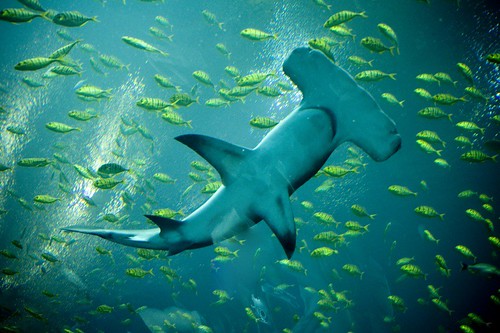Shark week 2014 – my daughter’s favorite show this week! Posted by Kasia on Aug 17, 2014 in Nature
What do you think I have been watching for the past week on the Discovery Channel? Shark week (tydzień rekinów) of course! Very informative, amazing, scary…and my daughters (although at times it probably wasn’t appropriate for 2 and 5 years old…) loved it too! They learned a lot and I have to say that I was amazed by some of the facts and different informations about sharks.
This gave me an idea to write a quick post about the subject…Today let’s talk Polish about sharks (rekiny)!
There are more than 465 known species of sharks (Istnieje ponad 465 znanych gatunków rekinów) living in our oceans today. Sharks are an apex predator (apeks drapieżnik) at or near the top of their marine food chains, and they regulate the populations of species below them. Research has shown that massive depletion of sharks (ogromne zubożenie rekinów) has cascading effects throughout the ocean’s ecosystems (ekosystemy oceanów).
Sharks (Rekiny) belong to a family of fish that have skeletons made of cartilage (szkielety wykonane z chrząstki), a tissue more flexible and lighter than bone. They breathe (oddychają) through a series of five to seven gill slits (szczeliny skrzelowe) located on either side of their bodies. All sharks have multiple rows of teeth (liczne rzędy zębów), and while they lose teeth on a regular basis, new teeth continue to grow in and replace those they lose.
Shark ‘skin’ is made up of a series of scales (łuski) that act as an outer skeleton for easy movement and for saving energy in the water. The upper side of a shark is generally dark to blend in with the water from above and their undersides are white or lighter colored to blend in with the lighter surface of the sea from below. This helps to camouflage them from predators and prey (To pomaga ukryć je przed drapieżnikami i zdobyczą).
There are many species of sharks found in the oceans around the world.Some of them are very big while others are quite small. Some of them are to be feared while others mind their own business and they are very calm. You may be surprised to learn some of the largest species of sharks in the ocean are the nicest ones to encounter (niektóre z największych gatunków rekinów w oceanie są najmilsze w spotkaniu).
Here are some most popular sharks:
Great white shark – Żarłacz Biały
Tiger shark – Żarłacz/rekin Tygrysi
Whale shark – Rekin Wielorybi
Bull shark – Żarłacz Tępogłowy
Hammerhead shark – Rekin Młot
Goblin shark – Rekin Goblin
Blue shark – Żarłacz Błękitny
Lemon shark – Rekin Cytrynowy
Basking shark – Żarłacz Olbrzymi
Megamouth shark – Megamouth Rekin
Did you know that the film “Jaws” — though heavily fictionalized — was based on a real incident in 1916, where four people were killed by a shark off the coast of New Jersey?
Do następnego razu… (Till next time…)

Build vocabulary, practice pronunciation, and more with Transparent Language Online. Available anytime, anywhere, on any device.
About the Author: Kasia
My name is Kasia Scontsas. I grew near Lublin, Poland and moved to Warsaw to study International Business. I have passion for languages: any languages! Currently I live in New Hampshire. I enjoy skiing, kayaking, biking and paddle boarding. My husband speaks a little Polish, but our daughters are fluent in it! I wanted to make sure that they can communicate with their Polish relatives in our native language. Teaching them Polish since they were born was the best thing I could have given them! I have been writing about learning Polish language and culture for Transparent Language’s Polish Blog since 2010.





Comments:
oktypok:
If I may suggest some other version to the Polish phrases 🙂
“Apeks drapieżnik” sounds unfamiliar, woulnd’t “drapieżnik wyższego/najwyższego rzędu” be more clear? I admit I wouldn’t undterstand this without the context, although I am quite interested in biology and studied dilligently at school.
I wouldn’t say “szkielety wykonane są z…” but “szkielety składają się z…”. “Wykonane” means “made (by human effort)” and is never used to talk about natural objects or phenomena. Obviously we can’t make sharks yet.
Also “zubożenie rekinów” feels a little funny, as if sharks were stricken with poverty. I guess something along the lines of “spadek liczebności” would be more appropriate.
Finally, “to pomaga ukryć je” is a little misleading, the reader may want to ask who hides sharks in the seas and oceans, or whether the sharks care so much for the scales to be hidden. I guess “to pomaga im ukryć się” is more natural, as in this context “hide” calls for the reflexive verb as the Polish equivalent.
I found your text pleasant to read and quite informative. I admire your effort to write about our tricky language and I hope you come up with many interesting topics soon 🙂
Pozdrawiam 🙂